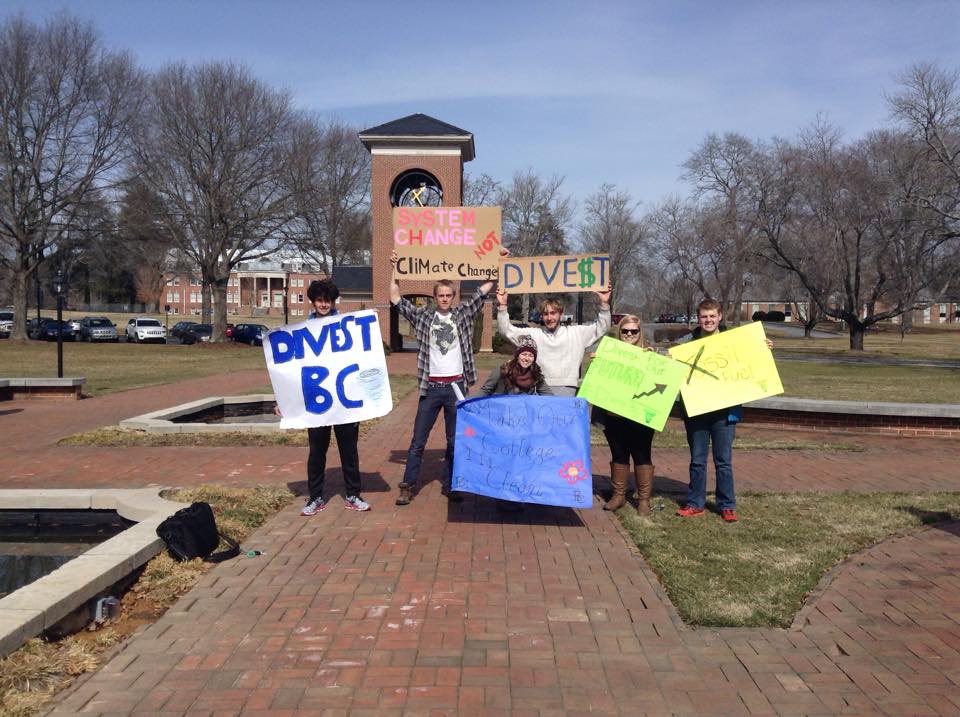Story by Burton Hodges
Nearly 70 people rallied in front of the Beam Administration building at Brevard College on Friday afternoon, Feb. 13, in support of a campuswide effort to divest the schools’ funding in fossil fuels.
Sponsored by the Brevard College Greens club, the rally was part of a student-led initiative to raise awareness on campus and campaign for the Board of Trustees to authorize the process of divestment, which would make Brevard College the first school in the Southeast to do so.
“I’m calling on the students of Brevard College to use their powerful and inspirational voices to ignite change on this campus to start a large-scale movement for divestment in North Carolina,” said senior Emily Crowley, an Environmental Studies major and organizer of the event.
The rally was in conjunction with Global Divestment Day, an event created by the grassroots movement 350.org, which aims to drop global carbon dioxide levels from the current 400 parts per million to 350.
The idea of divesting Brevard College was brought to the school last winter by Jim Reynolds, associate professor of geology and an active member of the Sierra Club chapter in Western North Carolina. With Reynolds’ guidance, Crowley and fellow co-president of the Greens club, Rory Northam, began the process of initiating the divestment movement on campus.
Petitions for support began circulating around Brevard College, receiving over 400 signatures from the student body and nearly half of the faculty and staff.
Following a sit-in last November at Brevard College’s J.A. Jones Library, Crowley and Northam were invited to present the petitions and research to the schools’ investor committee, which decided to take the proposal in front of the Board of Trustees on Feb. 19.
“I’m very confident that the Board will go along with it,” said Jerry Stone, head of the investor committee.” They will give us the authority under the college’s investment policy to move forward and look for new opportunities to invest in that aren’t involved in fossil fuels.”
Nearly 3 percent of Brevard College’s endowment, or $606,000, is invested in various areas of the fossil-fuel industry. The trick, Stone said, is finding new opportunities that will replace these investments. With the goal being complete divestment by 2018, Stone said he’s convinced the school can chose better investments and even “start a green fund” within the next three years.
“Look at our mission statement,” said David Joyce, President of Brevard College. “We are committed to an experiential, liberal arts education that encourages personal growth and inspires artistic, intellectual and social action. Be careful what you wish for — this is education.”
Burton Hodges is a senior at Brevard College majoring in political science and communications. He is the campus news editor at The Clarion, the college’s campus newspaper. He is also president of the Student Government Association.




We the undersigned are proud to stand in favor of fossil fuels. Based on our honest attempt to reach a balanced, big-picture perspective on coal, oil, and gas, we passionately believe that the economic and environmental benefits of fossil fuels far outweigh the hazards, and that it is not a “necessary evil” but a moral imperative to make use of the most productive, life-giving energy sources available to us at any point in time. But unlike the divestment movement, we do not ask universities to take an official stand in our favor on this complex issue, which requires extensive education and thought—not official dogma and stigmatization..
http://www.forbes.com/sites/alexepstein/2013/08/28/universities-must-reject-environmentalist-calls-to-divest-from-the-fossil-fuel-industry/
Mr. Peck claims to be proud of the irrefutable observations and science that the Arctic ice cap is melting; sea level is rising; the oceans are acidifying; the carbon dioxide content of the atmosphere is increasing exponentially; toxic metals are being strewn across the landscape all because he stands with fossil fuels. Cleary, Mr. Peck and his flippant attitude toward societal destruction has not pulled his head out of the sand for a very long time. This attitude is a grave danger to society. For some reason, he wants to leave a dying planet for his children.
He “passionately believe[s] that the economic and environmental benefits of fossil fuels far outweigh the hazards, and that it is not a “necessary evil” but a moral imperative to make use of the most productive, life-giving energy sources available to us at any point in time” and that is why he promotes the melting Arctic ice cap; sea level rise; the acidifying oceans ; the rising carbon dioxide content of the atmosphere, and toxic metals are being strewn across the landscape without an ounce of economic analysis, even though it certainly flies in the face of his own self-interest and that of his family and friends. Hey, this isn’t a religion based on the blind faith he espouses; this is the most urgent global crisis mankind has faced. Clearly, sunlight is actually ” the most productive, life-giving energy sources available to us” but those with their heads in the sand never see it. It appears that Mr. Peck is the one who needs extensive education. He clearly understands neither the divest movement or the crisis at hand. He provides not a shred of evidence to substantiate his claims. Compare that with the vast majority of climate and earth scientists who actually know what they are talking about.
http://chronicle.com/article/Why-We-Said-Goodbye-to/147929/